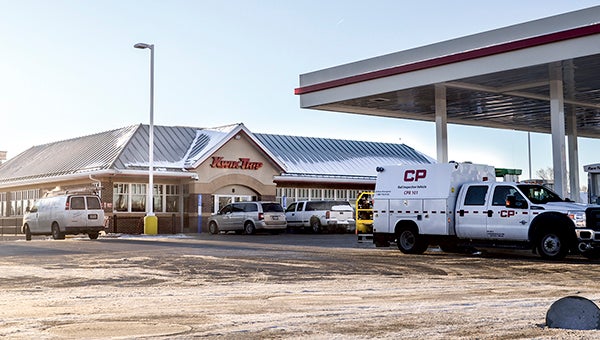Animal rights investigator says issues stem from push for speed
Published 10:23 am Friday, November 13, 2015
The undercover investigator who recorded videos of alleged animal welfare violations at Quality Pork Processors says the issues he witnessed stemmed from shortcuts meant to keep production moving.
Compassion Over Killing, a Washington, D.C.-based animal rights group, released video clips Wednesday of footage taken by an undercover investigator at QPP, a Hormel Foods Corp. supplier, at its Austin plant.
The investigator spoke out more about what he witnessed Thursday, though he and Compassion Over Killing declined to release his name. The investigator says he saw workers using excessive force with paddles and electrical prods in sensitive areas of the animals as a way to keep animals moving through production lines. The investigator also said he saw workers pull or drag pigs by the mouth without them being stunned to keep them moving.
“If you spend basically too much time trying to get hogs, pigs moving down the lines the supervisors will take note of that and come down hard on the workers,” the investigator said.
But Nate Jansen, QPP’s vice president of human resources and quality services, said the company already has several measurements and safety measures in place that allow the company to intervene.
“We operate under some of the highest standards and operating procedures that are out there to ensure the food that we produce is safe,” Jansen said. “We work closely with the USDA in ensuring that we comply with and exceed the safety and quality standards.”
In light of the findings, Compassion Over Killing is calling for the U.S. Department of Agriculture to reconsider or cease the Hazard Analysis and Critical Control Points (HACCP) Inspection Models Project (HIMP), an inspection system that involves fewer USDA inspectors and quicker processing lines. QPP’s Austin plant is one of a few across the country that’s testing the process.
Compassion Over Killing has argued the faster speeds allow QPP to slaughter 1,300 hogs per hour, compared to 1,100 at a typical facility, and she said the faster speeds produce more risk.
Though the process dates back about 10 years, the USDA is reviewing the program with plans to announce its findings next year, which could determine whether it is allowed to expand to hundreds of other hog facilities nationwide.
Compassion Over Killing is calling for a reevaluation of the program since it argues it takes government inspection and review from the government trained employees and puts it in the hand of the companies.
“There is a fundamental flaw in expecting companies with a financial interest in processing as many animals as possible as quickly as possible to adequately police themselves,” Compassion Over Killing wrote on its website.
Compassion Over Killing has completed more than 25 investigations over 10 years, but the QPP investigation was the first at a HIMP facility. Compassion continues to call for the USDA to reconsider HIMP, arguing it forces workers to take “inhumane shortcuts.” However, the USDA disputed the pro-vegetarian group’s claim that the faster inspection system was to blame. Adam Tarr, a spokesman for the federal Food Safety and Inspection Service, said that system is being used only farther down the production line, where carcasses are sorted.
The group says QPP was not targeted specifically, even though it’s one of only a handful of facilities that uses HIMP standards.
At slaughterhouses like QPP, animals are required to be stunned unconscious before being killed. While the investigator said hogs are supposed to be killed within 60 seconds of being stunned, he says he saw the process take longer, which increases the likelihood animals came to their senses before the process was complete. He says he captured footage of and saw hogs moving to right themselves while they were bleeding out and when they were being drug to a scalding tank, which he says means an animal may have been alive and conscious during the scalding.
However, the North American Meat Institute’s Vice President of Public Affairs and Animal Welfare Committee Liaison Janet Riley says they reviewed the online video clip and found the animals “appeared properly stunned and insensible to pain, as required by federal law.” She went on to argue video of the animal righting itself was “distant and blurry.”
“Our ‘Glass Walls’ videos, narrated by Dr. Temple Grandin, explain that animals can show uncoordinated movement after stunning, but that does not mean the animal is alert and aware,” she said in the written statement.
Compassion Over Killing maintained the animals were improperly stunned and dragged, and the group’s attorney Lisa Winebarger argued that “consumers should be able to determine for themselves” whether it was done properly through the video. She said that the push for speed comes down to money, as consumers demand affordable meat products, which leaves companies looking to produce high quantities at a low cost.
However, Jansen and the North American Meat Institute both questioned the fact the online video was edited, so it doesn’t show everything.
“What you’re looking at is an edited clip and if you were to look at the full-length sequence of events that would show that these animals were handled properly,” Jansen said.
The investigator says he worked for about five months at QPP, with about three-weeks working over the livestock area in September and October. That’s when he covertly recorded multiple hours of video, which Compassion Over Killing says has been entirely turned over to the USDA for investigation.
Winebarger argued Compassion has found issues at other plants too, and she said it could be a “systemic issue” of workers getting desensitized after many years on the job.
But Jansen said QPP trains has policies to ensure animals are treated well, and Hormel issued a statement saying it has a “zero tolerance policy for the inhumane treatment of animals” and holds its suppliers to the same high standards.
“We have very strict policies in place regarding the humane treatment of animals,” he said, noting all employees are required to adhere to those standards.
QPP is reviewing the footage, and Hormel said it has reviewed the video and will work with QPP and the USDA to take “any necessary corrective action.”
But Compassion Over Killing said the public will have to come to its own conclusion.
“We think people should know exactly what these animals are experiencing,” Winebarger said.





